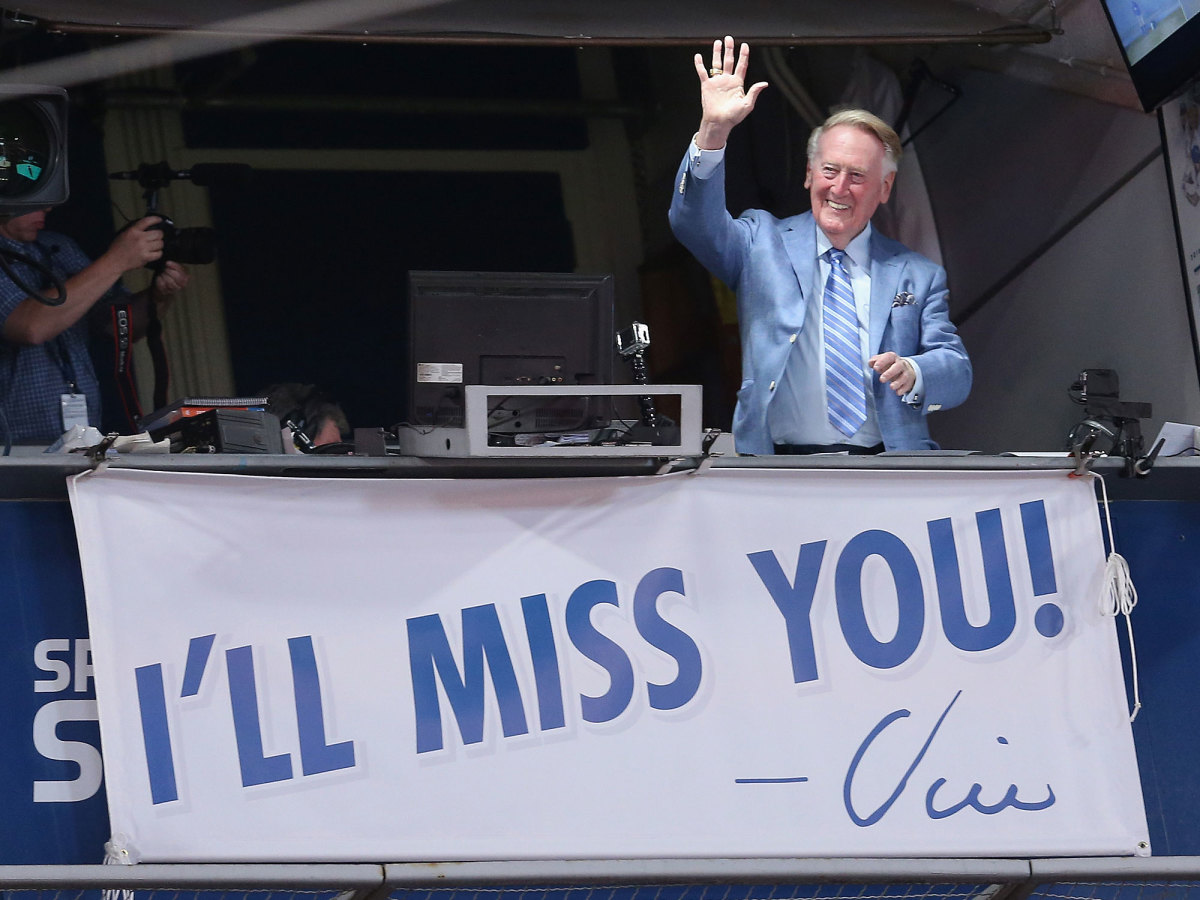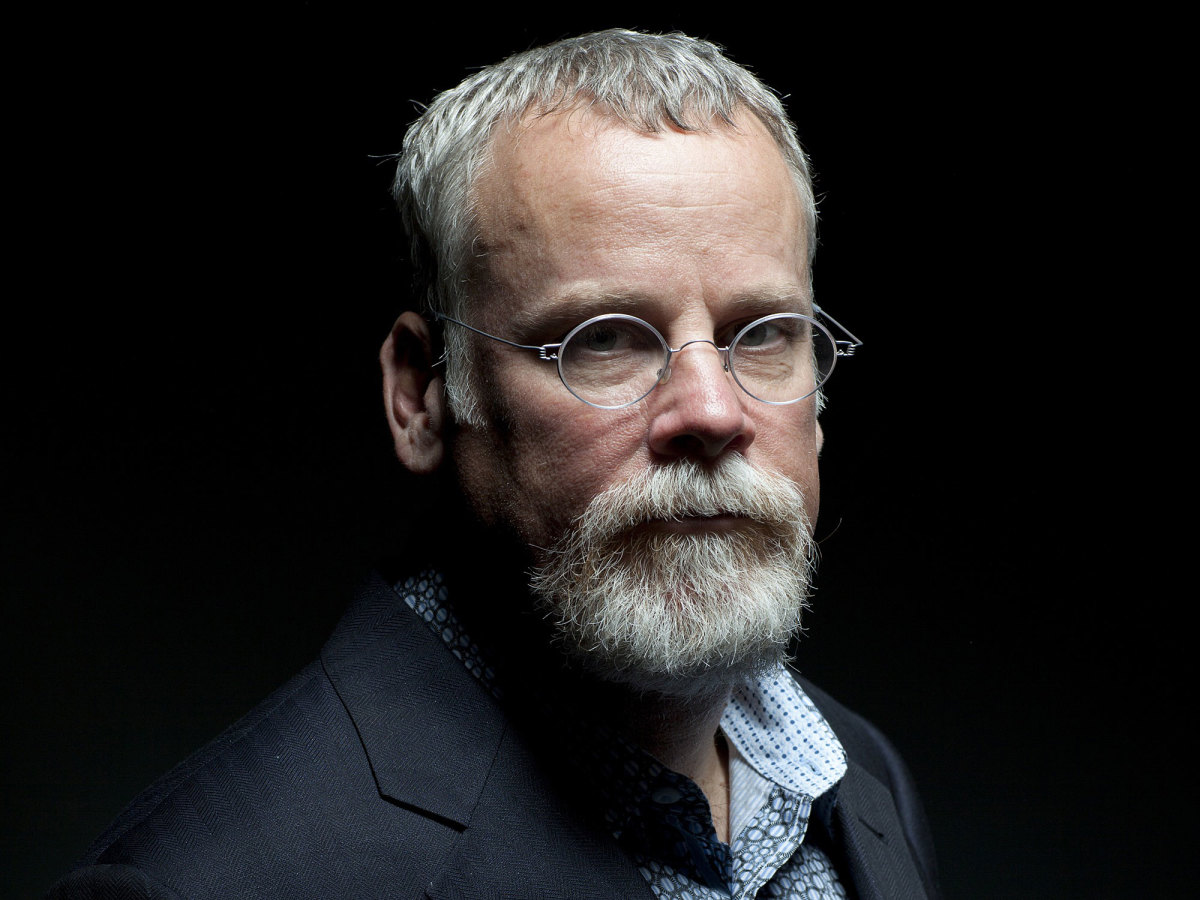Crime writer Michael Connelly has a special way of saying goobye to Vin Scully

Michael Connelly has published 28 novels since 1992, so he has had plenty of opportunities to dedicate them to the people who have contributed to his literary success, which includes 60 million copies sold and translation into 39 languages. At the front of the 18 books centered upon his most famous character, the LAPD detective Hieronymus “Harry” Bosch, he has honored, among others, his parents, his wife, his daughter, his friends, his editors, the librarian who introduced him to To Kill A Mockingbird and, in 2005’s The Closers, “the detectives who have to look into the abyss.” Connelly’s 19th Bosch mystery, The Wrong Side of Goodbye, will be released on Nov. 1, and the author has chosen to dedicate it to a different sort of influence, though one of great importance to not only his life but those of his characters.
“To Vin Scully,” the dedication reads. “With many thanks.”
Los Angeles, where Connelly’s gritty crime novels are set, can be a uniquely isolating place, due to its sprawl and its dependence on automobiles. For almost 60 years—starting in 1958, when the broadcaster and the team debuted in Los Angeles after leaving Brooklyn, until he retires after this Sunday’s game against the Giants—the 88-year-old Scully has provided nightly companionship to a city of loners. His is the voice that unites and comforts the town’s cops and criminals, and everyone in between.
This was true for Connelly, who is now 60 and who arrived from South Florida to report on crime for the Los Angeles Times in 1987, five years before he published his first Bosch novel, The Black Echo. Working the crime beat meant a lot of traversing the traffic-choked city alone at night, and he always tuned his car radio to the same soothing, genial voice.
It was also true for Connelly’s best-loved creation, Harry Bosch, to whom the author gave a rough upbringing in the city’s orphanages and youth homes, and for whom Scully’s broadcasts provided warmth and consistency, and light, in a dark world in which there otherwise seemed to be none.

When Connelly was enlisted to turn Bosch’s exploits into an Amazon series, starring Titus Welliver, a few years ago, he knew where he wanted the show to start: with his hero mid-surveillance on a hillside in Echo Park, Dodger Stadium lit up in the distance. He also knew whose voice he wanted to be the first one heard. The problem was that the show couldn’t acquire the rights to use one of Scully’s broadcasts, so Connelly had a better idea.
In 2009, Connelly had interviewed Scully for a recurring Parade magazine column called “Conversation With My Hero.” That experience accounts for most of the two hours the author estimates he has spent in Scully’s presence, against the untold hundreds he’s spent listening to him. He called Scully and asked if he might write a page of dialog for the broadcaster to read at the very start of his new show.
Scully, who had long loved reading crime novels on road trips and to whom Connelly had begun sending advance copies of his books, agreed at once, but with one condition. “I’d love to do it, but let me write that page myself,” he told Connelly. Connelly recorded his mock broadcast on his iPhone, and so Bosch begins not just with Scully’s voice, but also with Scully’s words.
The voice of baseball: Get to know Vin Scully, the man behind the mic
As Connelly grew into a publishing phenomenon and accumulated the resulting rewards, little thrilled him more than when Scully was moved, by one thing or another, to mention him or his work on the airwaves. He found himself particularly grateful for the existence of Brennan Boesch, the former outfielder for the Tigers, Yankees, Angels and Reds.
Even better than that, though, was the worldview that Scully expressed each day, one that affected Connelly not just as a prolific writer who must constantly conjure new stories to tell, but as a person. “What’s mostly inspiring is his ability to never be bored,” Connelly says. “He’s been doing this for 67 years, and every day it’s like he’s at the ballpark for the first time.”

Connelly, who now splits his time between Los Angeles and Florida, tries to attend about a dozen Dodgers games each season. He was in the stands on April 23, 1999, when Fernando Tatis, of the visiting Cardinals, performed the unprecedented and unrepeated feat of slugging two grand slams in the same inning. As is usually the case, someone had a transistor radio in the crowd, tuned to Scully. “I couldn’t believe how excited he was to say, ‘Well, folks, that hasn’t happened in the history of baseball,”’ says Connelly. That day, one of the many lessons he’d draw from Scully crystallized. “No matter what you’re doing, you can still be excited about it, and all in on it.”
In last year’s Bosch novel, The Crossing, Scully’s love of numerology helps the detective work through his theory of a murder. One of the broadcaster’s most reliable catchphrases is “deuces wild,” usually delivered when there’s a two-and-two count with two outs and two men on base. Bosch, hearing Scully’s voice in his head, begins to suspect that the killer might not have acted alone.
The Bosch mysteries are set in the present day, and the character has aged with them, and so Scully’s presence in the new book is more melancholy. “Man,” says one of Connelly’s lonely, hard-bitten characters. “What are we going to do now without Vinny?”
